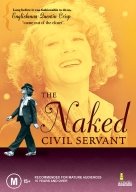The Naked Civil Servant (or How to excite and incite in three easy hair colours)
 Quentin Crisp has intrigued me since I saw him as one of the talking heads on the excellent documentary The Celluloid Closet. I checked him out at the time to find out why he was famous. I’d heard of him but had no idea why. It turned out that he was famous for, well, being himself. In the 60s he wrote his autobiography and in the 70s it was made into a Thames telemovie (ranked number 4 on the BFItv best ever television productions) and Crisp shot to fame.
Quentin Crisp has intrigued me since I saw him as one of the talking heads on the excellent documentary The Celluloid Closet. I checked him out at the time to find out why he was famous. I’d heard of him but had no idea why. It turned out that he was famous for, well, being himself. In the 60s he wrote his autobiography and in the 70s it was made into a Thames telemovie (ranked number 4 on the BFItv best ever television productions) and Crisp shot to fame.I finally tracked down a copy of The Naked Civil Servant (no, it wasn’t difficult but then, I wasn’t looking that hard) and it truly is fantastic. Crisp himself introduces it, remarking, as he does in The Celluloid Closet that there is little separation between reality and the fantasy of television and film, at least in his world.
John Hurt is an absolute revelation as Crisp. It is a role he was born to play and it is wonderful that Crisp developed it so well. His makeup and clothes were only outdone by his flamboyant personality. He lived his life as he wanted to, as an expression of his homosexuality and purposely made sure everyone knew it.
I have never felt that much of an affiliation with drag queens (not that Crisp is a drag queen) but I have always said that the GLBT movement would not be where it is today if it weren’t for their outrageous visibility. Crisp is the absolute pinnacle of this. One scene has Crisp walking into a gay bar only to be told that he is not welcome because if anyone came in he would give them away. When it comes to oppression, “straight acting” gay men have always found it too easy to slip under the radar when the situation gets too sticky. In the face of this Crisp is like a gay Ghandi, throwing himself into men’s fists until they begin to understand.
Crisp died alone in his New York flat in 1999 aged 91. You can check out more about his life
here.
Tags: movie review, films, gay

0 Comments:
Post a Comment
<< Home